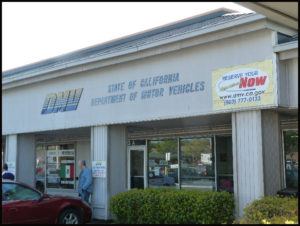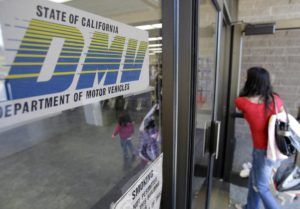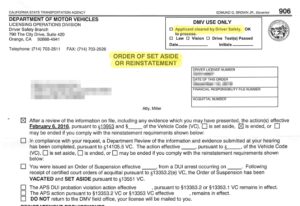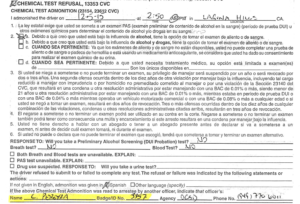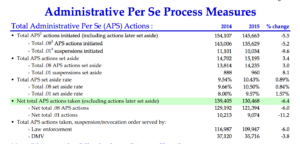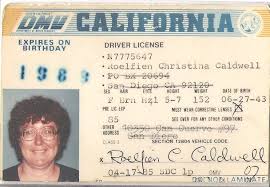DMV Hearings in DUI cases
Department of Motor Vehicle DMV Hearings in DUI cases
Our law firm’s clients often have many questions about DMV Hearings in DUI cases, and how a driver’s license, and the privilege to drive, can be affected by a DMV hearing where a DUI is involved.
If you have already had a license suspension, you might find the following links helpful for your situation:
- How do I get a restricted license?
- Infographic: What steps are involved in a DUI license suspension?
- My license was suspended – how do I reinstate it, so that I can drive again?
In the sections below, you will find the most common questions that our DUI defense lawyers receive from people facing a DUI. The answers below might be helpful in answering your specific questions (each of the questions below have a detailed answer further down on the page):
- I was arrested for DUI, and they took my license, and gave me a temporary DMV license. What do I need to do now?
- Why is there a separate DMV case from my DUI arrest, separate from my court case for DUI?
- What happens if I don’t request a DMV hearing at all?
- What happens if I win the DMV hearing in my DUI case?
- What happens if I lose the DMV hearing in my DUI case?
- How long is my license suspended for if I lose?
- What if I refused a breath or blood test – how does that change anything at the DMV?
- What if I was under age 21? How do DMV Hearings in DUI cases work then?
- What if I was on DUI probation when I was arrested for DUI?
- What if I have one or more prior DUIs?
- What are the win and loss statistics for DMV Hearings in DUI cases?
- What are the chances of winning the DMV hearing in my case?
- What are my rights at a DMV hearing?
- Do I have the right to a public defender at my DMV hearing?
- What is the procedure for a DMV hearing – what happens at the hearing?
- What can I do to help my chances of winning the DMV hearing?
- With DMV Hearings in DUI cases, can I tell the DMV how much I need to drive?
- How can you win a DMV hearing?
- I need a photo ID, or I need a physical photo license to rent a car. How can I get one from the DMV?
- I need to drive. Can I get a restricted license, or work license?
- How do I get my full license back?
- How does the court interact with the DMV, and my license?
- What can a lawyer do to help me with my DMV Hearing?
1 – I was arrested for DUI, and they took my license, and gave me a temporary DMV license. What do I need to do now?
When you are released from your DUI anywhere in California, the arresting officer will confiscate your driver’s license and provide you with a pink “Notice of Suspension“. This notice acts as a temporary license for 30 days. A temporary license is a full license with no restrictions.
More importantly, this document also gives you notice that you are entitled to the DUI hearing to prevent the suspension of your license–but only if you request it within ten (10) days of the arrest.
It bears repeating, since it’s so important – after an arrest for driving under the influence (DUI) of alcohol , you only have 10 days to act until or you could lose your license. If your case is in Orange County, you must contact the Office of Driver Safety in the City of Orange, at (714) 703-2511, or have an attorney do this for you. Or, you may contact our Orange County DUI Lawyers, and we will schedule the hearing for you, free of charge, with no obligation to have us handle any part of your case.
The DMV is extremely strict about their 10 day deadline, and unless you were in jail, were unconscious in the hospital, or were out of the country, they are instructed to not give any flexibility as to the 10 day deadline.
How to measure the 10 day deadline: The 10 days for DMV purposes are measured from the day of your arrest. Counting forward, if the 10th day is on a weekend, or a holiday, then you would have until the close of business the following day. But do not delay. Getting a DMV hearing after the fact is possible, but is much more difficult than just making the request for a hearing within the 10 days. You can always cancel the hearing later, but you can’t get another chance at the hearing after the deadline.
What happens after that? Once you request a hearing, the DMV will set a future date for the hearing, 30 to 45 days in the future. The 30 day pink temporary license is extended beyond the hearing date, by the DMV, who will send you a new temporary license. They will also send you, or your attorney, a copy of all the evidence to be used in the hearing – the police reports, (including arrest reports and traffic collision reports), and the breath or blood test results, along with your driving record. The DMV does not coordinate with your court date, nor do they care. The court and the DMV do not communicate your hearing dates to each other.
2- Why is there a DMV proceeding from my DUI arrest, separate from my court case?
At some point in the past, the California legislature was concerned about people continuing to drive while their court case was pending (which can sometimes take up to a year), and wanted to create a procedure to get drunk drivers off the road more quickly. They created the admin per se system, to make a suspension automatic after 30 days, unless the driver had an administrative hearing, to make sure a suspension was not justified.
As an administrative procedure, a DUI hearing can deal only with your driving privileges. The DMV cannot send you to jail, or fine you, but they can suspend your driver’s license. The court handles all other punishment involving everything except your drivers license, and the DMV, and only the DMV, has jurisdiction over your driving privileges.
3 – What happens if I don’t request a DMV hearing at all?
If you don’t request a hearing within 10 days, then your license will be suspended automatically at the end of 30 days. Unless you are alleged to have refused a test, were on DUI probation, or were under 21, you can reinstate your license or be eligible for a restricted license once you go through a 30 day hard suspension of driving privileges, and:
- Enroll in an approved DUI school,
- Submit proof of insurance, through an SR-22,
- Pay a $125 reissuance fee to the DMV, and
- For cases in Los Angeles County only (and three specific Northern California counties), install an ignition interlock device (IID) in any vehicles you own or operate.
4 – What happens if I win the DMV hearing in my DUI case?
If you win the DMV hearing in your case, your license and your driving privileges are reinstated in full. In the legal jargon used at the DMV, the potential suspension is “set aside”. Since the DMV extended your temporary license beyond 30 days to cover the date of the hearing and the date of the decision, and since the temporary license is a full license, you will not have suffered any loss of driving or loss of your license at all. Your physical license will be returned to you.
The DMV will also issue a written order and mail it to you showing that no action is taken against your license and that you won the DMV hearing.
5- What happens if I lose the DMV hearing in my DUI case?
If you lose the DMV hearing in your DUI case, the punishment is exactly the same as if you had never requested the hearing at all. Either way, the DMV imposes one punishment – an automatic four month driver’s license suspension.
In this case, where you’ve lost the hearing, the order you receive after the hearing will have the future date when your suspension will start.

6- How long is my license suspended for if I lose?
The DMV will suspend your license for four months for first time offenders. Unless you are alleged to have refused a test, were on DUI probation, or were under 21, you can reinstate your license or be eligible for a restricted license once you go through a 30 day hard suspension of driving privileges, and do all of the following:
- Enroll in an approved DUI school,
- Submit proof of insurance, through an SR-22,
- Pay a $125 reissuance fee to the DMV, and
- For cases in Los Angeles County only (and three Northern California counties), install an ignition interlock device (IID) in any vehicles you own or operate.
If you just wait out the DMV four month suspension, you can get your driving privileges back once you pay the $125 fee and show an SR-22 proof of insurance.
7- What if I refused a breath or blood test – how does that change anything at the DMV?
With a refusal DUI case, the issues to be decided at the DMV, and the evidence presented, changes.
The issues in a refusal admin per se hearing are as follows:
- Did the officer had probable cause to pull you over, and to believe you were DUI?
- Were you lawfully arrested for DUI, that is, did the police officer follow all legal requirements for a lawful arrest?;
- Were you told that if you refused to submit to or failed to complete a test of your blood, breath, or (when applicable) urine, your driving privilege would be suspended for one year or revoked for two or three years; and
- Did your response clearly show that you understand the officer’s advisement, and that you refused or failed to complete a chemical test?
The DMV cannot suspend your driver’s license without finding all of those issues above true, with admissible evidence, supporting each issue. If any one of the above is missing information, then the DMV cannot suspend your license for a refusal, and you win the case.
Punishment for a Refusal at the DMV
With a DUI refusal case, that also changes the punishment. The DMV has a hard one year suspension of your license- that means no driving at all, and no restricted license is possible – if there is a finding that you refused a test. That is the punishment for violating the implication of consent (the implied consent law) that when you got your license, you promised that you would submit to any breath or blood test when asked to. The DMV feels you breached your end of the bargain by refusing, and takes away your privilege to drive for one year.
- A first offense will result in a 1-year suspension.
- A second offense within 10 years will result in a 2-year revocation.
- A third or subsequent offense within 10 years will result in a 3-year revocation.
Proving the refusal at the DMV hearing from a DUI:
The DMV relies on the “Chemical Test Refusal – 13353 CVC” form, which appears on the back of the DMV’s DS-367 form, to provide sufficient information to make their case that a refusal occurred.
Above you will find the DMV refusal page, which is introduced as evidence in every DMV refusal hearing in a DUI case. Our Orange County DUI attorneys argued this page in a hearing at the DMV that we won, and this version is partially in Spanish. The officer has to completely fill out the form (and this one was not filled out properly, which is why we won this refusal hearing at the DMV), and has to clearly indicate what the response from the driver was to the offer to take a test. (in this case the officer wrote “NO”).
8- What if I was under age 21? How do DMV Hearings in DUI cases work then?
The DMV, and the law contained in the Vehicle Code, takes a “zero tolerance” position as to DUI cases where the driver was under age 21. Since a person under age 21 is not able to purchase alcohol, and it is illegal for a person under age 21 to consume alcohol, the State of California wants to stop anyone in the pattern of drinking and driving (and violating the law) as early as possible.
For under age 21 hearings, which are triggered by an arrest, or a citation, for violations of California Vehicle Code VC23140(a), or VC23136, or VC23224 (possession by a minor of alcohol under age 21), the issues at the hearing to be proven are as follows:
The issues at an under 21 DMV hearing from a DUI or related charge:
- The driver was under 21 years old;
- At the time of driving, the driver had a blood alcohol content of 0.01 percent or higher as measured by a chemical test or PAS device;
- The test was lawful, and was administered by a peace officer who had reasonable cause to believe that driver had consumed alcohol.
The punishment for losing an under 21 DMV hearing from a DUI:
- A first offense will result in a 1-year suspension.
- A second offense within 10 years will result in a 2-year revocation.
- A third or subsequent offense within 10 years will result in a 3-year revocation.
Because anyone under 21 driving under the influence of any alcohol, or in possession of any alcohol, carries a one year driver’s license suspension, it is especially careful to carefully go over every part of the evidence to be used in the DMV hearing for all factual defenses, and legal defenses, to win the DMV hearing.
9- What if I was on DUI probation when I was arrested for DUI?
Being on DUI probation means that you have pled guilty to a DUI in court, and are subject to court probation. Because, in California, the first term is not to violate any law, and a further term is not to drive with any measurable amount of alcohol in your system, being caught with alcohol in your system can cause you to face a one year driving suspension, even if you were not above a .08% blood alcohol level, not impaired, and not under the influence.
In other words, if you are on DUI probation, are stopped and tested, and are .01% or anything higher, you can face a one year hard suspension – that means no driving whatsoever – on top of any other suspensions (like the 18 month or higher suspension for a second time DUI).
What are the issues at a DUI probation DMV hearing?
At a hearing to prove you were driving with any alcohol while on DUI probation, the DMV has to prove, with admissible evidence, under the DMV’s burden of proof, the following three issues-
The issues at an a DUI probation test or related charge:
- Can it be proven that the officer had probable cause to stop you before determining you had alcohol in your body?
- Were you on DUI probation?
- Did a test, taken under the State’s legal standards, show that you had a .01% of alcohol content in your body, or higher?
Issue number one is a legal issues having to do with the reason for the stop in the first place. Issue two requires actual proof of the plea in court and the probation terms and dates. And issue three requires that a properly calibrated and maintained, approved device, that meets the state’s breath testing requirements, was used and actually measured .01% or higher.
10- What if I have one or more prior DUIs?
If you have a second time DUI, or a third time DUI (the law, and the DMV, considers a prior another DUI within ten years that exists looking back, offense date to offense date), then the DMV will use the same issues as a first time DUI case, that is, they most prove:
- Did the peace officer have reasonable cause to believe you were driving a motor vehicle in violation of Vehicle Code Section 23140 , 23152 , or 23153 ?
- Were you placed under lawful arrest?
- Were you driving a motor vehicle when you had 0.08% or more by weight of alcohol in your blood?
From there, only the punishment changes. For a prior within ten years, the DMV will suspend for 18 months or longer for a second, and will revoke your driving privileges for three years on a third time DUI if you lose.
11 – What are the win and loss statistics for DMV Hearings in DUI cases?
The DMV keeps statistics on the number of hearings that are conducted, and the results. The results show that the number of total APS actions are dropping, year to year. This matches the overall drop in the rate of DUI arrests, and cases in California.
The DMV published statistics also show that, from that total amount of all hearings , there was an increase in the number of DMV wins – that is, the number of suspensions “set aside” and licenses returned to drivers. That increase was less than one percent, however. 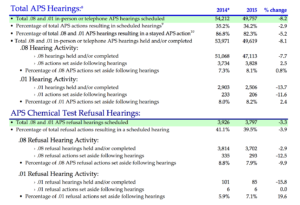
You will note that for regular .08 blood alcohol hearings, the win rate for drivers or licensees at DMV hearings is below 10% – that is very low. It was 7.3% for 2014, and the win rate was 8.1 for 2015, the last year statistics are available.
For .01% APS hearings at the DMV, which would be DUI cases involving persons under age 21, or on DUI probation, the DMV win rate was 8.0% for 2014, and the win rate was 8.2% for 2015, the last year statistics are available.
That is surprising, as at those hearings, any amount of alcohol is enough to prove the alcohol issue of the case. The more difficult .01% cases had a higher win rate than the .08% cases. The reason why the win rate might be higher for these tougher cases is that there is more likely to be a DUI lawyer involved.
For DMV refusal hearings, the DMV splits cases into .08% and .01%, although at hearings, the DMV considers the alcohol amount to be irrelevant.
For .08% cases, the refusal DMV hearing win rate was 8.8% for 2014, and 7.9% for 2015.
For .01% cases, (again, DUI cases involving persons under age 21, or on DUI probation), the DMV hearing refusal win rate was 5.9% for 2014, and 7.1% for 2015.
The separate statistics that appear hidden in the DMV Office of Driver Safety PDF reports, on the DMV website, refine the data even more, by showing what percentage of drivers or license holders have an attorney, and what the win rate for those that have an attorney are, compared to those that don’t have an attorney.
Of those above statistics covering all DMV hearings, which the percentage where the driver or their attorney won range from 5.9%, up to 8.2%.
Those that had an attorney won almost 80% of those subset of cases (78+%). The inverse also seemed to be true – of those that only represented themselves, and did not have a DUI lawyer handle the DMV hearing, the win rate of those select cases was under 20%. In other words, for people that represented themselves at the DMV, there was almost a 80% losing rate.
In the opinion of this Orange County DUI Attorney, I feel that, after viewing thousands of DMV hearings, this is for one reason: Drivers show up to the DMV hearing prepared to argue how much they need to drive, rather than treating it as a legal proceeding.
The DMV considers need to drive irrelevant for these types of hearings. These are legal hearings, and the DMV requires legal objections, like hearsay, foundation, or conclusory objections, to sustain a motion to exclude part of the evidence presented.
The statistics from the DMV show that as far as a win rate at the DMV, our law firm has been very much above average, with our string of wins at the DMV. But even so, the overall rate is very low.
You still have a better chance of winning with a trained lawyer who is familiar with these hearings, but some clients choose to not retain our services, or the services of any lawyer, for the DMV portion of their case, and I can understand why, looking at the DMV statistics.
12- What are the chances of winning the DMV hearing in my specific case?
Given the statistics above, expecting to win any DMV hearing in a DUI is not statistically likely. And yet, lawyers do win DMV hearings. Every case is different, and very few DUI cases have exactly the same facts – some are better or worse than others.
However, I always recommend that clients at least request a DMV hearing – for the reason that it gets you the police reports and the DMV’s Officer’s Statement Form, which contains everything they need to prove in the case. It also tells you what you must defend against. You can always cancel a DMV hearing later.
If there is a missing information, or the DMV is not able to prove any of the three issues in the case (see above), then you may very well win your DMV hearing. Officers often put the wrong dates on DMV documents, cut and paste from different reports from other drivers on the same date, and sometimes fail to submit adequate information to prove the case.
An example of winning at the DMV – Solovij v. Gourley.
In the case of Solovij v. Gourley, a well known DMV case, the Santa Barbara Police Officer that filled out the probable cause statement in that case only stated as follows:
“The subject vehicle was observed speeding down State Street in Santa Barbara, and was stopped, and found to be DUI.”
The appeals court decided against the DMV, and in favor of the driver, saying that was not valid probable cause. That statement was a legal conclusion, and raises more questions than it answers. Questions such as the following flow naturally from that one sentence:
- How do you know the vehicle was speeding?
- Was a radar, laser, speedometer pace, or other measurement used?
- What was the speed limit, and was it properly set according to California law (using a speed measurement survey)?
- Was the measuring device properly maintained and calibrated?
- Which direction was the vehicle going?
- For how long was the vehicle observed?
- Which laws or code sections were violated?
- How do you know the driver was driving under the influence?
- What were the symptoms, if any, that led you to believe that the driver was under the influence when stopped?
- What date, and what jurisdiction did this occur in (for jurisdiction purposes of the DMV)?
As a result of this one case, the DMV sent out a memo to all officers in the State of California, reminding them what adequate probable cause was, and changed the probable cause form, to remind officers to describe in great detail ALL the facts and circumstances that constitute probable cause.
And you know what? Officers still make conclusions such as “speeding”, or “swerving”, or “going too fast or too slow” on reports. That leads to an objection and exclusion under the Solovij ruling, and the DMV’s own instructions.
Sometimes it is the crime lab that messes up. In one second time DUI case that we handled, we went to do a blood retest, and they could not find the vial. There were two people with similar, but not the same names, and there were two vials with the same vial number in the batch tested for the blood tests done that day.
Since our client was tested at a .27% bac, but the field sobriety tests showed good performance, that second time DUI case was dismissed, in court, (as the impairment alleged was inconsistent with the “blood” that may have not even been our clients, and we won the DMV hearing, as well as the court case (via dismissal)
It is very possible to win your DMV hearing, but you won’t know that until you look at the reports and facts of the case to be used against you.
13 – What are my rights at a DMV hearing?
At the DMV DUI hearing, you are entitled to all of the following:
- To review the evidence against you, and challenge the evidence against you, through legal objections and legal argument
- To subpoena and present witnesses (including the arresting officer) at your own expense;
- To cross-examine any witnesses, and
- testify on your own behalf.
14 – Do I have the right to a public defender at my DMV hearing?
No. A public defender will not and cannot handle your DMV hearing for you. You only have the right to be represented at your DMV hearing in a DUI by an attorney at your own expense. This means that, unlike criminal court, the DMV will not appoint an attorney for you in the event you are unable to afford your own. You only have two options – to represent yourself, or to have a DUI defense lawyer professionally handle your DUI hearing,
15 – What is the procedure for a DMV hearing – what happens at the hearing?
At a DMV hearing, you can handle your hearing via telephone, or have your hearing in person. Via telephone, you will call the hearing officer, or the hearing officer will call you, and you will go through the same procedures as if you were there in person.
Should you have a telephonic or in person hearing? That is completely up to you. Obviously, the telephonic hearing is more convenient. But I always have an in person hearing for a few reasons.
For one, the DMV officer has the original document in their possession. The instructions at the top of the first exhibit (the DS-367) tell the officer to fill out the form in Black Ink, and to send to the DMV within 5 business days. Often, the police officer doesn’t follow those instructions. The officer might also use white out to cover up mistakes, which are always relevant, as the “inherent reliability” of the document is an issue in every case with documentary evidence.
Doing in person hearings also allows me to develop a feel for what strategies impress each hearing officer, or work best, and see their expressions in person. Also, scientific studies show that when someone is deciding something face to face with another person, they are 300% more likely to decide in that person’s favor than if they are not in person with the subject.
When you are at the DMV Hearing Office in Orange, you park, and take the elevator to the fourth floor. You then check in at the reception desk, and then when the hearing officer is ready, you are brought back to the hearing office.
The hearing office is nothing like a courtroom. It’s a regular working office, and you will sit at the opposite side of a desk from the hearing officer. There will be a microphone on the middle of the desk, which will record everything onto a CD, for use in case of appeals or review of the hearing.
The hearing officer will ask you to state your name, and your mailing address. The hearing officer will then state the issues to be decided at the hearing (which are covered above).
The hearing officer will then take the evidence (which was mailed to you earlier), and split them into separate exhibits. While there are some differences between how hearing officers like to divide evidence, in a typical DMV hearing, you will be facing the following documents, each as separately marked exhibits:
- Exhibit 1 – The DMV DS-367 “Officer’s Statement”
- Exhibit 2- The police arrest report
- Exhibit 3 – The traffic collision report (if there was an accident only)
- Exhibit 4 – The breath or blood test results;
- Exhibit 5- The driving record of the licensee.
Some hearing officers like to combine several documents into one exhibit, but the above is typical.
The hearing officer will then allow you to make an opening statement, if you wish, and will then allow you to make objections to each document. Those objections can be for any legal reason, including invalid foundation, containing hearsay that is improper, or violating state testing laws. The objections will then usually be sustained, or overruled, on the spot.
The DMV hearing officer will then allow you to present any evidence you like, including testimony of expert witnesses in a DUI, documents related to breath test defenses or blood testing defenses, or live witnesses relevant to the case.
When the case is completed as far as the presentation of evidence, the DMV hearing officer moves the evidence in and takes the matter under consideration. You are allowed to make a closing argument if you wish. The hearing officer then ends the phone call, or walks you out of the DMV office at the close of the DMV hearing.
The hearing officer usually mails a written four to five page decision, either granting a set aside, winning the DMV hearing, or entering a license suspension, losing the hearing.
You have appeal rights, including the right to an administrative review from DMV Sacramento, for a fee of $120.
16 – What can I do to help my chances of winning the DMV hearing?
Planning counts at a DMV hearing. We always do a written brief, outlining the objections and the issues in favor for our client, given the evidence. That helps more on appeal, as that gets entered as an exhibit at the original hearing, and makes clear what our position is, and exactly what our objections are, even if the record wasn’t clear. Some other DUI attorneys always subpoena the police officer, as you get testimony from that officer under penalty of perjury, that can be used in the court proceedings. However, if the officer brings testimony that fills in a hole in the evidence, that may not help you.
Going over every page of every document, line by line, will help you spot potential problems everywhere they occur on the documents presented. And we always do a timeline, which helps show whether or not there was a violation of the 3 hour rule of California’s Title 17.
17- With DMV Hearings in DUI cases, can I tell the DMV how much I need to drive?
The DMV website answers that best, by stating: “Your need for a driver license is not an issue at the APS hearing.” So no. As mentioned above, under the chances of winning a DMV hearing, the big mistake most people not represented by a DUI lawyer make at the DMV hearing is not making legal objections, but instead telling the DMV how much they need to drive. The DMV considers that irrelevant to the hearing, even if most drivers consider it highly relevant to their situation.
18 – How can you win a DMV hearing?
We have won many DMV hearings for our clients. You can see details about that on our case results page, and in our Case Studies:
- A win at the DMV for a client
- Winning a second time DUI with a refusal, an accident and a .23% alcohol level for a client
- Strategies for winning a DMV hearing
While there are many ways to win a DMV hearing, the best way is to carefully go over the evidence, looking for potential objections, argument, problems and defenses to present at the hearing. Knowing hearsay law and objections greatly helps. Technically, the documents presented by the DMV all are hearsay, but come in under the government records exception, only if they meet the requirements of that objection. In our opinion, having an in person hearing helps slightly. Having a written brief helps protect an appeal. And bringing the caselaw relevant to the case, and the DMV’s own memos, can instruct and educate the DMV hearing officer to see things your way. We have had DMV hearing officers thank us for presenting what the law is and what cases are involved in specific DMV issues.
19 – I need a photo ID, or I need a physical photo license to rent a car. How can I get one from the DMV?
The DMV will give you a duplicate license – that is, another copy of the DMV license that was taken away from you at your arrest, but only if you request it within the first 10 days you have to request a hearing. This is a loophole under the law.
After ten days have expired, whether you have requested a hearing or not, the DMV will tell you that you are only eligible for a California ID card. That card will have the same number as your driver’s license, but cannot be used for driving purposes.
If you have a U.S. Passport, that can also be used for ID purposes.
For either the duplicate license, or the California ID card, you need to fill out the DMV’s DL-44 form. That form is not one you can download from the DMV’s website. You will need to visit any DMV branch office to get one, and fill it out and pay the fee.
20 – How do I get my full license back?
If you have won the hearing, your license is usually mailed back to you. You are also entitled to a fee-free duplicate license at any branch DMV office.
If you have lost the DMV hearing, assuming you did not win any appeals, you can get your license back after you complete the alcohol school required, as long as you pay the $125 reissuance fee to the DMV, and have an SR-22 proof of insurance on file.
21 – How does the court interact with the DMV, and my license?
As mentioned, the court is independent of the DMV, and cannot suspend your license, or give you a license. However, certain court actions can affect your license.
For one, if you plead guilty to a DUI, the DMV is notified, and two points and a notation that you had an alcohol related offense is put on your driving record. Even if you won a DMV hearing, this event can suspend your license under a separate action.
If you lost the hearing, the court conviction can cause your license to be suspended a second time – a second concurrent suspension. And if your court conviction for DUI happened in Los Angeles County, the DMV will require that you install an ignition interlock device (IID) within 30 days of your conviction.
22 – What can a lawyer do to help me with my DMV Hearing?
A lawyer can review your case carefully, speak with you about what happened, and come up with a strategy custom to your case that addresses all issues and presents them to the hearing officer in your case. In addition to all the strategies above, we always look at the legal issues that can win a DMV hearing on the spot, based upon insufficient evidence:
- Was the DS 367 Officers’ statement properly sworn and filled out? Is there missing information that is essential to the case?
- Are there significant mistakes made in the Officer’s Statement DMV form and police report?
- Was the official duty presumption rebutted — is there evidence that the officer did not properly perform his official duties?
- Was the test administered within 3 hours of driving?
- Was the officer properly trained and qualified to administer the breath test?
- Did the officer continuously observe the subject for 15 minutes before administering your breath test at the police station pursuant to Title 17 of the California regulations which outline the proper breath testing procedures?
- Did the police follow proper procedure with the breath or blood tests?
- Did the officer actually have a legal violation to justify pulling the car over?
- Would an expert witness help in the case?
- Can we show that the driver was under .08 at the time of driving?
- Is there insufficient or improper DMV evidence at the hearing?
As you can see, we are very thorough. That wins DMV cases, and we can help you with your case.
Contact Our Law Firm to come up with a plan for your DMV hearing today.
Contact Robert Miller & Associates today. We can get started with a strategy on what to do regarding your DUI hearing right away.


